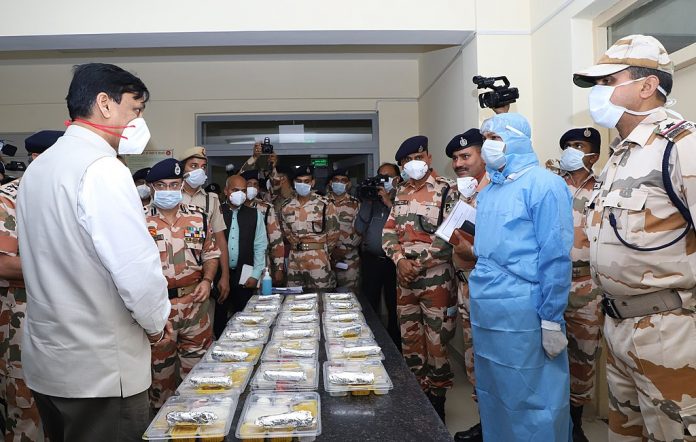With its reported COVID-19 cases crossing 17500, India is now bracing itself for hard times. Although India’s drastic measure of an extended nation-wide lockdown of 40 days – came at a time when the country recorded a meagre 562 cases – has received appreciation from international bodies like the United Nations, things have only become worse since then. The country witnessed perhaps the biggest migration wave since the 1947 partition when tens of thousands of migrant workers, who got stranded in faraway cities without adequate provisions for survival, tried to return to their villages. This not only defeated the purpose of the lockdown but also created massive governance and logistic problems.
On another plane, various reports have emerged from different parts of the country where people, including responsible figures such as ministers and top-level bureaucrats, openly flouted the social distancing norm and gathered for celebrations of various kinds – one such religious congregation by Tablighi Jamaat has now become the epicentre of the contagion. Moreover, experts warn that India’s surprisingly low number of cases could be attributed to its low rate of testing.
Faced with such contingencies and the likelihood of community spread now looming over the country, serious political measures are needed to avoid a series of potential catastrophes ranging from increased unemployment to economic collapse and subsequent social unrest. Indeed, the threat is not only epidemiological but also socio-economic.
Various opposition parties have been mounting criticism against the government for what they term serious mismanagement of the crisis. Questions are being raised over fund allocation, the competence of policies, and clarity of plans and actions. Nonetheless, it is left to the highly politically polarised public to (dis)agree with such allegations on the basis of their partisan biases.
However, the most pertinent question now is regarding the way forward. For instance, how long can India lock down the entire nation without having its deleterious consequences on the economy? This is especially when India’s economy had already started experiencing a major slowdown before the present coronavirus crisis set in. India has already witnessed the lowest GDP in more than a decade, coupled with the highest unemployment rate in more than four decades. A full-fledged outbreak of the novel coronavirus will indubitably push the country to the brink of a major economic crisis – probably the greatest economic emergency since independence.
Hence, the country clearly cannot afford any misguided policies or slip-ups at the current juncture. And at the same time, it needs to have forward-looking efforts and policies. Viewed thus, it is also imperative to secure convergence of greater political will and policy acumen.
National Unity Government as a Political Measure
Much has been said, suggested, and analyzed about viable social, economic, and public health care measures and policies to deal with the COVID-19 crisis in India. It’s time now to talk about extraordinary political measures as crisis response. As the largest democracy in the world, India needs to demonstrate unprecedented political will and cooperation that goes beyond any ideological and religious divisiveness and rise above partisan politics to save the country.
Admittedly, the current government has a dearth of ministers with proven expertise and capabilities to take on a health crisis of this magnitude and scale. The recent demise of some of the senior leaders and ministers have been a massive blow to the government. Former ministers like Arun Jaitley, Sushma Swaraj, and Manohar Parrikar are some of the notable names in this regard.
Besides, the irrational statements from responsible ministerial figures distract and undermine concerted efforts and cooperation among various stakeholders including people, government and bureaucracy. For instance, the Union Minister of State for AYUSH (ministry for the promotion of indigenous alternative medicine systems in India) claimed that Prince Charles of Wales recovered from COVID-19 with the help of Ayurvedic medicine, a claim later refuted by the Royal Residence in London. In a different incident, the Minister of State for Social Justice and Empowerment, Ramdas Athawale, stated that his ‘Go Corona Go’ chant is actively helping in containing the virus. He claimed the entire world has now recognized the power of his slogan. It needs to be stressed that, such statements are often informed by the heightened nationalistic, populist fervour of politics assiduously playing out in the country and are counter-productive in the present situation.
Given the scenario, what India needs is a profound political rethinking. Establishing a unity of national government, drawing manpower and expertise from various sources including opposition parties, is worth considering as an option. Known as a national unity government, it essentially entails a government formed by a coalition of parties, especially in times of a crisis or emergency. This is neither new nor a utopian idea. There has been international precedence of unity governments in countries such as Nepal, the UK, and Israel. Currently, talks are ongoing in the UK for a ‘COVID Coalition’. Similarly, Israel is contemplating the possibility of forming an ‘emergency government’.
More or less, the same has been hinted by the former Reserve Bank of India Governor and professor of finance at the University of Chicago Booth School of Business, Raghuram Rajan. While commenting on the current precarious state of the Indian economy, Rajan suggested bringing together expertise from disparate sources, including from opposition parties. In a blog titled “Perhaps India’s Greatest Challenge in Recent Times,” he wrote: “If…the government insists on driving everything from the Prime Minister’s Office, with the same overworked people, it will do too little, too late”.
Taking cues from his suggestion, the government of India may seriously ponder over it. As a matter of fact, while the call for a unity government must come from the government, having cooperation and consensus in place requires a greater role from all the political parties.
Indeed, in a country like India, this is an ambitious idea and more so considering the currently exceedingly polarised socio-political scenario of the country wherein political bickering and blame games are profound. However, it needs to be understood that what India is experiencing has no precedent. To succeed, unprecedented political resolve and decisions are not only realistic but have become imperative. This has to be done in good faith and for the common good by the collective will of the people. At this juncture, it remains to be seen whether the legislative class will show the decisive political maturity and rise to the occasion.
The views and opinions expressed in this article are those of the author.

The author is a PhD Candidate in Public Policy & Management at the Indian Institute of Management (IIM) Calcutta, India. He holds an MPhil in Planning and Development from the Indian Institute of Technology Bombay, India. Recently, he has been a DAAD funded exchange scholar to the Centre for Modern Indian Studies (CeMIS), University of Gottingen, Germany. His research interests include public policy, South Asian history & politics, and migration.


